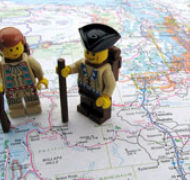The Work of a Maker
Blog / Produced by The High Calling
Our three sons are all avid Lego builders.
The spread of ages from oldest to youngest is seven years, and the three of them have always gotten along fairly well. They actually seem to enjoy doing things together, from exploring the caves near our property to watching episodes of Dr. Who. Their favorite collaborative activity is building with Legos. They are all very creative Lego builders, and inevitably when the whole family is together at vacation times there will be an extended building time with all of them together up in the play room (which long ago turned into a Lego room) for a whole afternoon or evening.
Perhaps not surprisingly, when the boys were younger these joint Lego building ventures also prompted the few occasions when there were serious (and at times heated) disagreements between them. The most common cause for a disagreement was if one of them had invested time in a creation, and another had scavenged a piece off of that creation to use on a new project. Woe be to the brother who knowingly or even unknowingly destroys the creation of another brother. Then the accusations and recriminations would begin!
“You took that piece of my space ship!” (Or castle, or house, or city, etc.) “Sorry. I didn’t know you still wanted it,” comes the reply. Or, perhaps, “Well it’s my piece. You took it off my space ship two weeks ago.” And then it escalates. “Only because you took my piece before that.”
A Creator’s Love
I must say that I am actually sympathetic with the boys’ passions at these moments. I think it is a normal human response to care deeply about those things we have invested time and energy and talent into creating. Whether it is a Lego creation, or a house we built, or a book we’ve written, or an engineering project we designed, or a meal we prepared, or a garden we’ve tilled, planted, and weeded, we become personally invested in the results of our labors, and as a result we also feel protective.
Indeed, I think there is even something very good about that sort of protective care—though like anything we do, it can be corrupted by our human pride or possessive greed. In fact, I think we inherit from God Himself, as beings made in His image, not only the desire to create, but also the loving and nurturing and protective care He has for his own creation.
Several months ago my wife brought to my attention a passage in Revelation I had not before noticed or paid any careful attention to. Revelation 11:18 records a song sung by the twenty-four elders seated by the throne of God. “The nations were angry, and your wrath has come. The time has come for judging the dead, and for rewarding your servants the prophets and your people who revere your name, both great and small—and for destroying those who destroy the earth.”
It is that last line that caught my attention, and still makes me pause and reflect. God made a very beautiful cosmos, and a magnificent and stunningly beautiful earth set in the midst of his sea of stars. He cares for it as any loving creator cares for his creation. He cares for his children, the humans made in his image. But not only for his. He cares for the earth itself. And woe be to those who destroy it.
Literally. Woe be to them. That’s what the book or Revelation tells us. The contrast in this passage is between those who revere God’s name and those who destroy his creation, the earth. To destroy the creation is to disrespect—to not revere—the name of the Creator.
That is something I think we need to keep in our minds as we go about our daily work. God is not a selfish teenage boy. Far from it. And yet I think that before we act in ways that result in the destruction of God’s earth through our consumptive or exploitive behaviors, it is worthwhile to meditate on how we feel when something we have invested in is destroyed by somebody else.
QUESTIONS FOR REFLECTION:
What have you made that you care about? How have you felt when others have destroyed the works of your hands? What things have humans done to God’s earth that you think are displeasing to God or bring him sadness? How can you revere God’s name in your own care for his creation?
Image by Andrew Becraft. Used with permission. Post by Matthew Dickerson.











